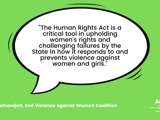The right to life may be at risk in cases involving domestic violence.
In Opuz v Turkey, the European Court of Human Rights (ECtHR) found that Turkey had violated the right to life of Ms Opuz, who was killed by her son-in law. Before the killing, the police had received many reports about the son-in-law’s violent behaviour and death threats towards Ms Opuz and her daughter. However, they did not act on this information and Ms Opuz was ultimately killed. The Court also found that the Turkish Government had violated both women’s right not to be tortured or treated in an inhuman and degrading way (Article 3) and the right not to be discriminated against (Article 14).




